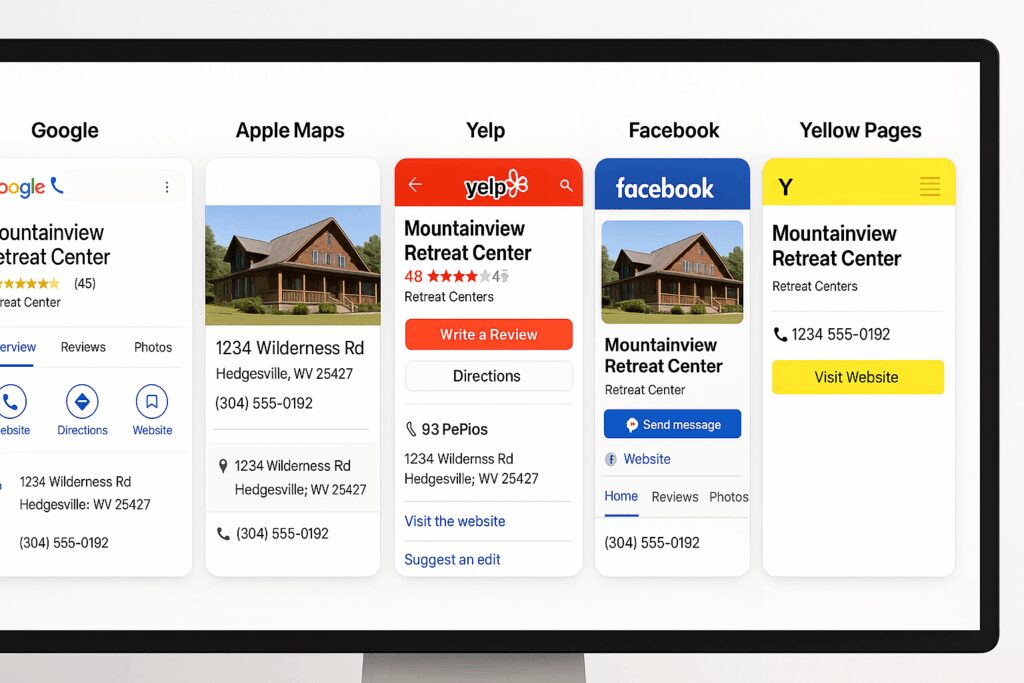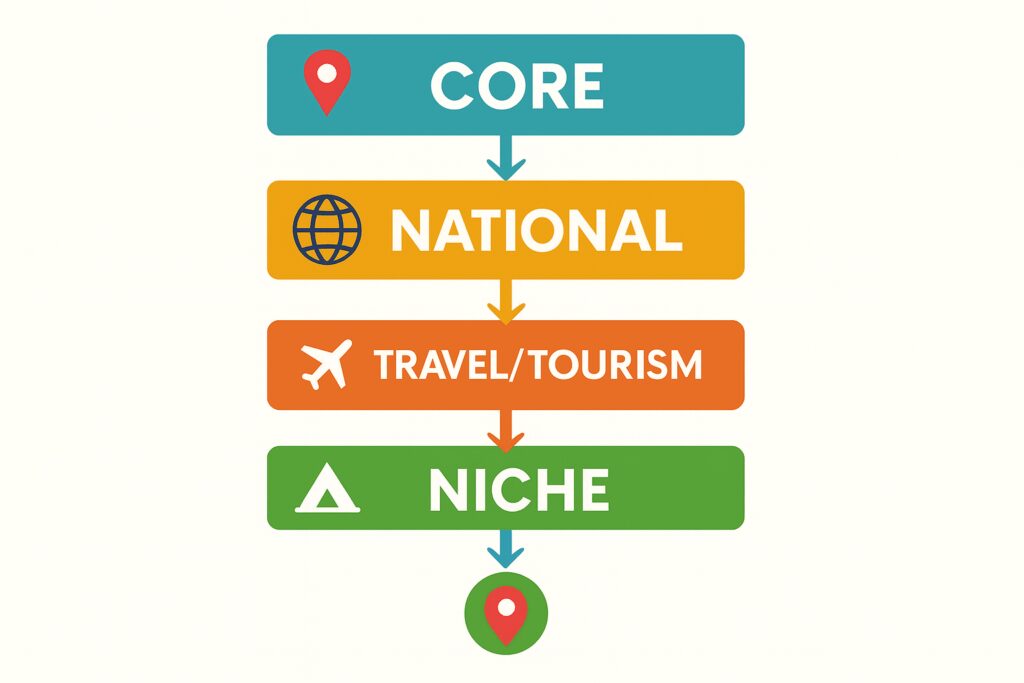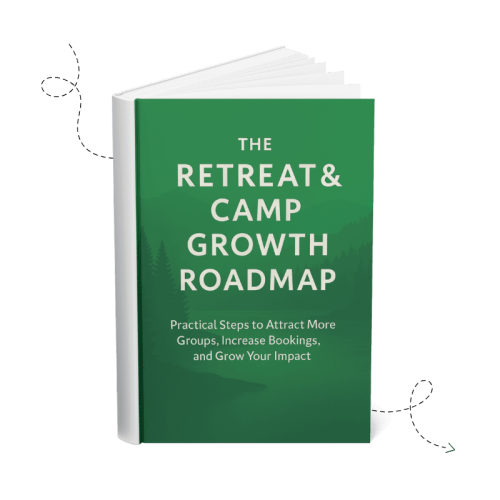Retreat & Camp Growth Roadmap Focus Area: Expand Directory Listings
Introduction
Imagine a group leader planning a retreat. They know they need lodging, meals, and outdoor space—but they don’t know you exist. They go online and start searching.
If your retreat center or camp isn’t showing up in that moment, you’ve already lost the opportunity.
Directory listings are one of the simplest, most cost-effective ways to expand your visibility without redesigning your website or buying ads. They put you in the path of planners on platforms they already trust—Google Maps, Apple Maps, Yelp, or niche Christian retreat directories. Yet this is still one of the most underused tools in ministry-based hospitality.
In this article, we’ll walk through a practical plan to use directory listings to make your center more discoverable, more credible, and more booked—starting with foundational platforms and expanding into targeted opportunities.
Why This Focus Area Matters
Your ministry’s digital presence is only as strong as its visibility. If potential guests can’t find you when they’re searching for places like yours, you’re invisible.
Directory listings multiply your presence across the web in ways that build trust and improve search rankings:
- Visibility: Appear in local map results, mobile searches, and review platforms when users search “retreat center near me” or “group camp rentals.”
- Credibility: Consistent, well-maintained listings—with photos and reviews—signal professionalism and care.
- SEO Benefits: Listings reinforce your authority with Google and other search engines, helping your website rank better for relevant searches.
- Cost-Effectiveness: Most listings are free, making them one of the highest-return marketing actions you can take.
For centers that rely heavily on word-of-mouth and seasonal bookings, directory listings create year-round visibility and help new groups find you organically.
Is This an Area You Need to Focus on Right Now?
Ask yourself:
- Have you claimed and fully optimized your business profile on Google Maps, Apple Maps, Bing Places, Yelp, and Facebook?
- Do you appear on national business directories such as Yellow Pages, Better Business Bureau, or Chamber of Commerce?
- Are you listed on travel and tourism sites like TripAdvisor?
- Do you show up on niche directories such as Retreat Central or Christian Camp Pro?
- Is your name, address, and phone number consistent across all listings?
If you answered “no” to any of these, this focus area can help you bring greater clarity, alignment, and impact to your outreach.
Putting This Focus Area into Practice
1. Start with Core Listings
These core platforms are the most critical because they dominate local search results and map listings, making them a primary way potential guests will discover your retreat center. They also carry significant influence with search engines, which use them to validate your business information. While they are essential for visibility, keep in mind that some may generate more individual consumer inquiries than group bookings, so their role is often as much about brand awareness and credibility as it is about direct conversions. These are the non-negotiable platforms that form the backbone of your online presence:
- Google Business Profile – Essential for maps and local search. See our guide to enhancing your Google listing for detailed steps.
- Apple Maps – Key for iPhone users and Siri searches.
- Bing Places – Important for Microsoft-based devices and services.
- Yelp – Trusted by travelers and mobile users.
- Facebook Business Page – Doubles as a directory listing and a social proof hub.
Even small, focused actions in managing your core directory listings can quickly improve your visibility and engagement. Claim and verify each listing, and ensure your name, address, and phone number (NAP) remain consistent across all platforms for maximum impact.

2. Add National Directories
National directories are a powerful way to expand your digital footprint because they appear in a wide variety of search results and are frequently used by search engines to verify your business details. Being listed on these platforms can help you reach beyond your immediate network and enhance your credibility in the eyes of both guests and search algorithms. While they may not always deliver a high volume of direct group bookings—since many cater more broadly to the public—their influence on your visibility makes them a valuable part of your marketing mix. Consider:
- YellowPages.com
- ChamberofCommerce.com
- Better Business Bureau
- CitySearch
- EZLocal
- Hotfrog
- Foursquare
- Local.com
- MapQuest
- MerchantCircle
- ShowMeLocal
- SuperPages
Pro Tip: Managing dozens of directory listings manually can be time-consuming and prone to errors. Third-party tools can simplify the process by letting you update your information once and automatically sync it across many platforms—saving hours of work and reducing the risk of inconsistencies. Our preferred tool at Improve & Grow is LeadHub, which directly integrates with key platforms like Google Business Profiles and Facebook, connects to 60+ directories in their network, and even offers features like review requests and response management. If LeadHub is not an option for you, other options to consider include BrightLocal, Moz Local, and WhiteSpark.
Submitting your retreat center to national directories builds credibility with both guests and search engines. When managed with the right tools, these listings can stay consistent, up-to-date, and optimized—helping you reach more people with less effort.
3. Don’t Miss Travel & Tourism Platforms
If you offer lodging or day-use activities, these large travel and tourism platforms can be especially important for visibility, as they attract high search traffic and often appear prominently in search results. While they can introduce your center to both tourists and event planners, it’s worth noting that many are geared more toward individual consumers rather than group bookings, so they may not be your top source of retreat inquiries. Still, having a presence here ensures you’re discoverable to a wide audience and can capture unexpected opportunities:
- TripAdvisor – Excellent for lodging or adventure activities.
- Booking.com, Expedia – For centers with cabins or overnight accommodations and a reservation system.
- The Dyrt, Hipcamp, Campspot – For public RV or campsite rentals.
These platforms not only increase visibility with travelers but can also introduce your center to group planners who may not be aware of you. A well-maintained profile with current photos, clear descriptions, and accurate availability can be the deciding factor that prompts an inquiry or booking.
4. Prioritize Niche Directories
Niche directories reach the most qualified audience—planners who are already looking for group retreats and actively seeking venues that match specific needs, values, or themes. These platforms tend to attract decision-makers further along in their planning process, making them especially valuable for generating highly targeted, conversion-ready leads. Examples:
- RetreatFinder.com
- RetreatGuru
- RetreatBoss
- FindTheDivine.com
- CampResource.com
- CampNavigator.com
- American Camp Association
- Christian Camp and Conference Association (CCCA)
- Christian Camp Pro
These platforms often allow filtering by amenities, group type, and activities, helping you attract aligned guests. While some of these directories are completely free, many are paid or offer premium tiers that can increase visibility. Take advantage of free listings whenever possible, and evaluate paid options carefully—consider whether the platform aligns with your target audience and whether the potential reach or visibility justifies the investment.
5. Tap into Local Business Directories
Community-based listings build trust and can drive weekday and off-season bookings. In many cases, these local directories reach audiences who are actively looking for nearby options, from school administrators and church leaders to local businesses planning team retreats. Being listed can also strengthen your credibility within the community and open doors to partnerships you might not otherwise access.
Look for:
- Local tourism websites (Destination Marketing Organizations)
- Chamber of Commerce directories
- Regional event calendars
Leveraging local business directories positions your retreat center as a trusted community resource. By maintaining accurate, up-to-date listings in these spaces, you not only reach potential guests nearby but also create lasting connections that can lead to steady off-season bookings and word-of-mouth referrals.
Directory Listings Optimization Checklist
When you strategically layer these directory types—core, national, travel, niche, and local—you create a network of discovery paths. Each type serves a unique role in reaching different audiences and search behaviors, ultimately multiplying the ways planners can encounter, evaluate, and trust your retreat center. To help you put this into action, we’ve created a practical checklist that walks you through auditing your current listings, spotting gaps, and prioritizing where to add or update profiles.
📥 Download the Directory Listings Optimization Checklist
Use it to:
- Audit where you’re listed now
- Identify gaps
- Ensure NAP consistency
- Schedule quarterly reviews
Closing Summary: This checklist is your roadmap for building and maintaining a strong, consistent directory presence. By following it regularly, you’ll not only increase your visibility in the places that matter most but also ensure that every touchpoint a potential guest finds online reinforces trust and credibility.
Mini Case Study
A Virginia-based retreat center we partner with was struggling to rank in local searches, which meant missing out on valuable organic traffic and inquiries for high-intent searches like “retreat center near me.” Our audit showed that they had little to no presence on many key business, industry, niche, and high-authority local directories. As part of a broader SEO strategy, we worked with them to develop a comprehensive company profile and used it to update and optimize their presence across core platforms like Google Maps, Apple Maps, and Bing Maps, along with numerous national, industry-specific, niche, and local directories. Over the following years, their organic search traffic grew by more than 88%. While this was one piece of a larger SEO effort, these specific directory improvements played a major role in boosting their local search rankings.
Putting It All Together
Expanding your directory listings isn’t about being everywhere—it’s about being easy to find where it matters most. Consistent listings boost trust, strengthen your SEO, and make it simpler for mission-aligned groups to reach you.
Key Takeaways:
- Claim and optimize core listings first
- Submit to at least 5–10 national directories
- Add industry directories when relevant to your programs or audience focus
- Join niche platforms relevant to your audience
- Review quarterly for accuracy

Ready to Take the Next Step?
Expanding your directory listings is a simple but strategic way to boost visibility, earn trust, and drive inquiries—without increasing your ad spend. Start with the basics, build from there, and stay consistent.
If you found this helpful, here are four great next steps to continue your journey:
🧭 Move to the Next Focus Area: Start Local SEO
Local SEO builds on your directory listings to help your website rank higher when local groups search online.
[Read Next Focus Area]
📘 Download the Retreat & Camp Growth Roadmap eBook
Get the full 3-stage system we use to help Christian retreat centers and camps grow with clarity and purpose.
[Download the eBook]
🌱 Learn More About How We Help Retreat Centers & Camps
We’re a Christian-owned marketing agency that helps ministries grow attendance, bookings, and impact through practical strategies rooted in clarity and stewardship.
[See How We Can Help]
🤝 Schedule a Free Discovery Call
Want help applying this to your unique situation? Let’s talk. We’ll explore where you are now, where you want to go, and how to take the next faithful step.
[Book a Discovery Call]
You don’t have to figure this out alone. Let’s build something meaningful—together.
Frequently Asked Questions
How do I manage so many listings without losing track?
While you can start with a simple spreadsheet to track each platform, URL, login, last update, and verification status, larger ministries will benefit from using a dedicated listing management tool. Our primary recommendation is LeadHub, which integrates with Google Business Profiles, Facebook, and 60+ other directories, while also offering features like review requests and response management. If LeadHub isn’t an option, other tools such as BrightLocal, Moz Local, or WhiteSpark can also help maintain accuracy and consistency across your listings.
What if my address, phone number, or name changes?
Update your Google Business Profile first, then systematically update other listings—ideally using a third-party management tool like LeadHub to make the process faster and more accurate. LeadHub can update your core and national directories in one place, ensuring all details remain consistent and current. Inconsistent information can confuse potential guests and weaken your search rankings, so using a tool to streamline updates is well worth the investment.
Are paid directory listings worth it?
Free listings should almost always be taken advantage of, as they provide valuable exposure without cost. Paid options can often be very effective, but their value depends on whether they provide access to an audience that aligns closely with your ideal guests and whether the platform can deliver that audience at a volume sufficient to produce a positive return. Test paid placements selectively—especially on niche sites where your target audience is highly active—and monitor results to ensure the investment is justified.
How often should I update my listings?
Review your Google Business Profile at least monthly, and review all other listings quarterly or whenever your hours, contact info, or seasonal offerings change. Refresh photos annually to keep your profiles engaging and up-to-date.
Do directory listings help with SEO?
Yes. Search engines use listings (often called “citations”) as a way to verify your location, legitimacy, and consistency across the web, which in turn strengthens your local rankings. The more accurate and widespread your listings, the more trust search engines place in your information—making it easier for your retreat center to appear in relevant local search results.
Can volunteers or part-time staff manage this?
Yes—directory management is ideal for delegation with clear instructions and quarterly check-ins. To make the process even smoother, consider equipping your team or volunteers with a third-party tool like LeadHub, which allows them to manage and update core and national directories from one place, automate review requests, and track changes—ensuring your listings remain accurate and effective with less manual effort.
Do we need separate listings for different programs?
Usually no. Use your listing descriptions to highlight all offerings, and link to specific pages on your site.
Is Facebook considered a directory listing?
Yes. It appears in search results, displays reviews, and provides up-to-date contact details.





